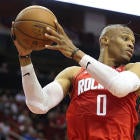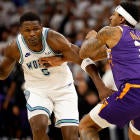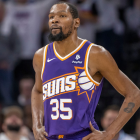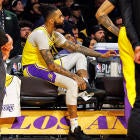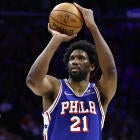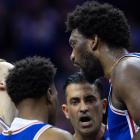Last season, James Harden scored fewer than 20 points on three occasions. His Houston Rockets lost those three games by a combined 66 points, with each one carrying a margin of at least 18. Harden scored only 19 points on opening night against the Milwaukee Bucks, and his Rockets did indeed lose. But against arguably one of the best teams in the league, that modest six-point margin is progress. The Rockets lost the game, but they won the war.
Houston had no alternative to Harden-ball last season. He either isolated opponents into oblivion, or his Rockets lost. Wondering what a 2-of-13 night from the field for Harden would have done to last season's Rockets would be a worthless thought exercise. It would be impossible because it literally never happened.
Harden attempted 14 or more field goals in every game the Rockets played last season, and he never made fewer than five. He reached 40 percent of his worst total from last season, and the Rockets very nearly took down a 60-win juggernaut. Russell Westbrook made up that lost offense.
He obviously did so in a literal sense. Westbrook's 24 points led the Rockets, and by his standards, 7-of-17 from the field and 3-of-7 on 3-pointers is fairly efficient. The real value Westbrook brought, though, came in diversity. Houston has relied so heavily on Harden over the past few years that it lost the transition game that Mike D'Antoni's rosters always thrive on. Westbrook brought it back.
The Rockets scored 27 fast-break points against the Bucks on Thursday. They averaged only 12 per game last season, per NBA.com. The Sacramento Kings led the NBA with an average of 20.9, while the Bucks allowed the fewest at 11.
Westbrook's presence enabled the Rockets to destroy the NBA's best transition defense, but that shouldn't come as a surprise. The Oklahoma City Thunder never finished lower than eighth in the NBA in fast-break points per game at any point in Westbrook's career. They had been entrenched in the top five for each of the past five seasons. Chris Paul rarely made plays like this.
BEARD X BRODIE 🔥 pic.twitter.com/NVv7jnjO68
— Houston Rockets (@HoustonRockets) October 25, 2019
It isn't just Westbrook's nuclear athleticism that makes this possible, though. It's how he uses it. His rebounding was perhaps as important an addition as his scoring. The Rockets finished 28th in the NBA in rebounding rate last season, putting an artificial cap on how many fast-break opportunities they could generate in the first place. The Bucks finished fifth in rebounding rate last season, but Houston won the battle of the boards in this game. Westbrook's 16 rebounds were the biggest reason why, and many of which led to plays like this.
One of my favorite plays from tonight. Russ was awesome in transition. pic.twitter.com/fdMB0Lh6ZB
— Samuel H. Quinn (@SamQuinnCBS) October 25, 2019
That is the value of adding perhaps the greatest rebounding guard of all-time. The middle-man is cut out. The fastest player on the court just starts out with the ball, and his elite passing ability creates open shot after open shot. The sort of role players who usually benefit from these kinds of catch-and-shoot looks feasted on them tonight. Rockets players not named Harden, Westbrook or Eric Gordon converted on nine of their 21 attempts from beyond the arc, many of which were assisted by Westbrook.
That isn't going to be the case every game, but the entire point is that it doesn't have to be. Harden isn't going to shoot 2-of-13 every game either. The Rockets went from a team with only one weapon to a team with two. As long as they have one working at full capacity on a given night, they are going to win most of the time. As tonight proved, they are going to have at least one on most nights.
Stopping the league's best isolation scorer requires an enormous commitment on defense. Asking the majority of NBA teams to do so without sacrificing the resources necessary to contain Westbrook is the real-life equivalent of asking a normal person to fight the Hulk and the Flash at the same time.
Daryl Morey didn't envision many 2-of-13 nights from Harden, but he traded for Westbrook as an answer for the possibility that one might happen. An 0-1 record is hardly ideal, but a six-point loss to the Bucks is adequate proof of concept. The Rockets acquired Westbrook to diversify their offensive portfolio, and one game in, they've succeeded.













